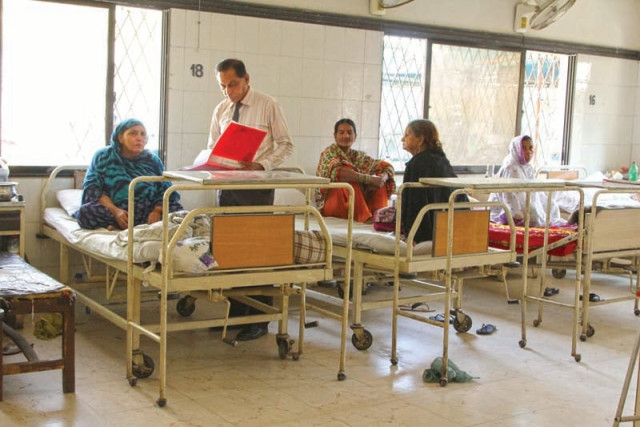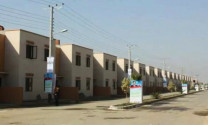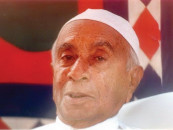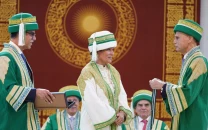Visit OPD of Pakistan’s only govt-run homeopathic hospital for only Rs5
KMC employees get free-of-charge consultation at the facility

The 40-bed, two-floor facility, which is known to a very few, is situated in Nazimabad next to the BSEK office. PHOTO: AYSHA SALEEM/EXPRESS
"The hospital was established for the promotion of homeopathy in 1983 by the then mayor of Karachi Metropolitan Corporation (KMC), Abdus Sattar Afghani," said the medical superintendent of the hospital, Dr Abdul Rasheed Vayani.
‘SIUT is a model for developing countries’
Despite being in a dilapidated state due to lack of proper structure, the hospital strives to provide health facilities to hundreds of patients coming from every nook and corner of the province on a daily basis. The register of the OPD had 122 entries on a particular day, out of which 21 were those of KMC employees.
Vayani told The Express Tribune that four doctors run the OPD from 9am till 1pm. The consultation fee per session at the OPD is Rs5, after which the patient gets free medicines for a day. Meanwhile, the employees of the KMC get free of charge consultation at the facility. Vayani further said that admission charges at the hospital are Rs25 and Rs15 are charged per day for a bed.
According to the medical superintendent, they are running the hospital efficiently despite the meagre funds allocated by the KMC. He said that the city needs at least three to four government-run homeopathic dispensaries to facilitate the patients.
The 40-bed, two-floor facility, which is known to a very few, is situated in Nazimabad next to the office of the Board of Secondary Education, Karachi. Within the vicinity of the hospital, a full-fledged market for homeopathic medicines has also emerged, which attracts a large number of patients who rely on this second most popular way of medical treatment across the world.
SIUT celebrates 40 years of free medical treatment
Furthermore, the hospital offers honorary, six-month house jobs to homeopathic doctors coming from the Pakistan Central Homeopathic Medical College and Hospital (PCHMCH), which is a private college situated next to the hospital.
Vayani, a homeopathic doctor of grade-18 in KMC, is currently heading the hospital. He told The Express Tribune that the land for the hospital was provided by PCHMCH in 1983 on the condition that the KMC would run it as a homeopathic hospital. The hospital has a total sanctioned staff of 46, including a director of BPS-19 grade, a medical superintendent and an administration deputy director of BPS-18 grade, and two medical officers, three resident medical officers and one deputy medical superintendent, each belonging to the BPS-17 grade. The total annual budget for the salaries of the hospital employees for the year 2015-2016 is Rs26.025million. The establishment budget for day-to-day expenses for the year is Rs2.5million, which was Rs3.54 million in the year 2014-2015.
"We have a variety of patients visiting us at the hospital," said Vayani. "But the majority are those who are either poor or believe in the homeopathic way of treatment." He said that homeopathic treatment is not as costly as allopathic. Most of the times, we prescribe local homeopathic medicines, which is a low-cost alternative to imported homeopathic medicines, explained Vayani, adding that if any patient insists, they prescribe imported medicines, which are comparatively expensive.
Advanced technology: ‘Molecular methods help diagnose diseases’
KMC health and medical services senior director Dr Salma Kausar lauded the efforts of the facility's administration. "Despite the scarcity of funds, the hospital administration is running the only homeopathic hospital of the country efficiently in the interest of the poor people of Karachi."
Patients' experiences
One of the indoor patients in the female ward of the hospital, Lal Bibi, who has been under homeopathic treatment for many years, said, "I cannot tolerate allopathic medicines [because of the side effects]. That's the reason I have been under treatment at this hospital."
Muhammad Khalil, 54, told The Express Tribune how he was seeking homeopathic treatment at a private facility. "I was under treatment at a private homeopathic dispensary for two months and the doctors had prescribed expensive medicines that I couldn't afford," he said. However, after being admitted at the government-run facility, he is hopeful that the doctors would prescribe him medicines according to his pocket.
Muhammad Saleh, who was accompanying his uncle in the OPD, said, "The overall condition of the entire block of the hospital should be improved for better facilitation of the patients who prefer treatment at the only government-run homeopathic hospital instead of allopathic treatment," he said.
Published in The Express Tribune, March 31st, 2016.



















COMMENTS
Comments are moderated and generally will be posted if they are on-topic and not abusive.
For more information, please see our Comments FAQ